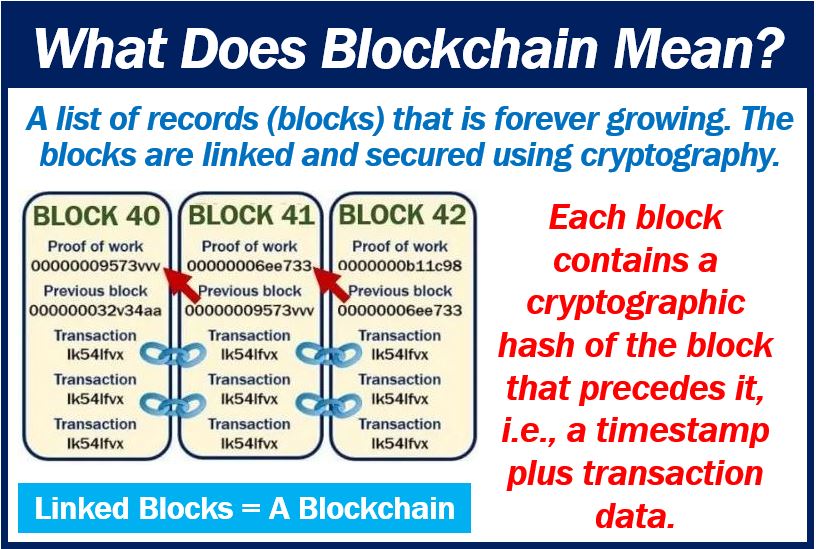Blockchain technology can be defined as digital ledgers which are tamper-resistant and tamper-evident, implemented without any central repository or a centralized controlling authority. It allows a group of users to store the details of their transactions in shared ledgers which normally cannot be changed or tampered with once they have been published.

In other words, blockchains are chains of data blocks containing records of transactions, chained or linked together with the help of cryptographic signatures, stored in shared ledgers, and supported by a network.
This technology is completely different from traditional databases, networks, web interfaces, and programmes. Responsible for the existence of cryptocurrencies like bitcoin, blockchain technology has become even more popular with the advent of reliable apps like Bitcoin Victory.
The immense popularity of cryptocurrencies is a clear indicator of the immense possibility and potential that blockchain technology has. In the ecosystem of health care, however, the implementation of blockchains is in a rudimentary stage with vast potentials to explore.
Blockchain technology can come in handy in some specific areas like management of medical records, providing security to healthcare information, keeping a personal health record, management of point-of-care genomics, and management of health records data.
Applications in the healthcare sector
Blockchain technology can enhance the healthcare ecosystem by working in the following ways:
Research
At present electronic health information records of patients can be automatically shared only within a network of organizations. This can be changed if blockchain technology is used to store the data, which would easily provide access to a large number of organizations while keeping the personal details of the patient hidden. This can help in medical research.
Easy switching of organizations
If stored using blockchain technology, patients would have the liberty of unlocking and sharing their personal information with other organizations as well. This can enable a seamless switching of organizations for individual patients. The quickness of this sharing process can be really useful in crucial cases as the hassle of switching medical institutions would be greatly reduced.
Improved patient care
The use of blockchain technology for storing medical information can improve the overall quality of medical services. Through blockchains, an integrated system of storing continuously updated and verified information can be created which can prevent miscommunications between various professionals and ensure that the patient gets a faster and more efficient treatment.
Data security
Data breaches are a major cause of concern for various health organizations. The use of blockchain technology in this sector can protect health information efficiently, thereby preventing any possible breaches. This is because with a blockchain each individual is provided with two keys- a private key, and a public key. The private identifier can be unlocked only for a limited span at a time. Further, with this level of personalization hacking would be limited to private information of individuals which can be easily traced and prevented.
Monitoring mobile health apps
With mobile health applications becoming increasingly relevant in the present times, the risks of hacking and virus attacks have increased. The use of blockchain technology can help in solving this problem.
If medical information collected from patients through these apps is stored in a blockchain they become very easily accessible for health care professionals. Besides, privacy breaches are very rare in blockchain technology.
Securing medical supplies
Blockchain can be put to use in tracing and securing pharmaceutical supplies. A blockchain of these supply details can be created and constantly updated. This would also guarantee the transparency of the process and even help in keeping a track of expenditures and carbon emissions.
Health insurance claims
Blockchain can come in handy in keeping a record of health insurance claims. It can store personalized insurance information for every user and keep a track of their health records. Since blockchain cannot be tampered with once it has been published, an accurate record of the customer’s health condition can be maintained without the slightest chance of fraud.
Tracking diseases and outbreaks
Blockchain can be very instrumental in tracking diseases and outbreaks on a real-time basis. Detailed information on the diseases can be stored in a blockchain and disease patterns can be explored through comparisons and analysis. This information can then at one be shared among all healthcare institutions, providing for effective control.
Although the use of blockchain in the healthcare sector is only at a nascent stage, it bears immense possibilities. When worked on with proper insight and infrastructure, blockchain can alter the system of storing healthcare information for the better. With its unique capacities, blockchain can enrich the healthcare sector in innumerable ways, thereby enriching our lives.
Interesting Related Article: “The Importance of Healthcare Software Development“

